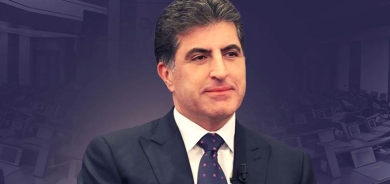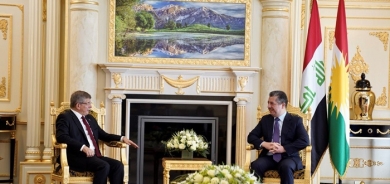First Syrian refugee health worker receives COVID-19 vaccine in Kurdistan Region

Qani' Muhyyadin, 34, is from the Kurdish-majority city of Qamishlo in northeast Syria but has resided in the Kurdistan Region as a refugee since October 2019 after he fled attacks by Turkey-backed forces on the city of Sere Kaniye.
Refugees and internally displaced people are eligible to receive the vaccines in the Kurdistan Region as part of the regional government’s coronavirus inoculation scheme.
Muhyyadin currently lives in Duhok city and works as a healthcare provider with the United Nations refugee agency (UNHCR) at Domiz 2 Camp.
“I am the first refugee health worker to receive the jab,” the doctor told Kurdistan 24 English on Sunday after he received the first dose of the British-Swedish Oxford-AstraZeneca vaccine.
Muhyyadin is a graduate of Damascus University, where he specialized in pediatric infectious diseases, a subject in which he also holds a Master’s degree.
The Kurdistan Region launched its vaccination campaign against COVID-19 in early March 2021 after taking delivery of the Chinese Sinopharm vaccine. The Region also administers AstraZeneca and the American-German Pfizer-BioNTech vaccine.
Kurdish health authorities, in order to ease the vaccination process, launched an online application form on which citizens, refugees, and displaced people in the region can all register.
So far healthcare workers have administered over 70 percent of the available coronavirus vaccines, Health Minister Saman Barznji told Kurdistan 24 on Sunday.
Philippa Candler, the UNHCR representative in Iraq, took to Twitter to thank the Kurdistan Regional Government (KRG) and its Iraqi counterpart for including refugees in the national vaccination campaign.
Muhyyadin is set to receive his second dose on July 2, he said.
Despite working for the UN agency as a medical doctor, he said he wishes to run his own private medical clinic in the Region, but technical and legal obstacles from the Baghdad government have so far prevented him from realizing that dream.
“Our problem is in Baghdad. They have hampered it, claiming we cannot work here,” the medical worker said, adding that he hopes barriers are removed so he can work in Kurdistan as his medical skills are “unique.”
Editing by Joanne Stocker-Kelly













